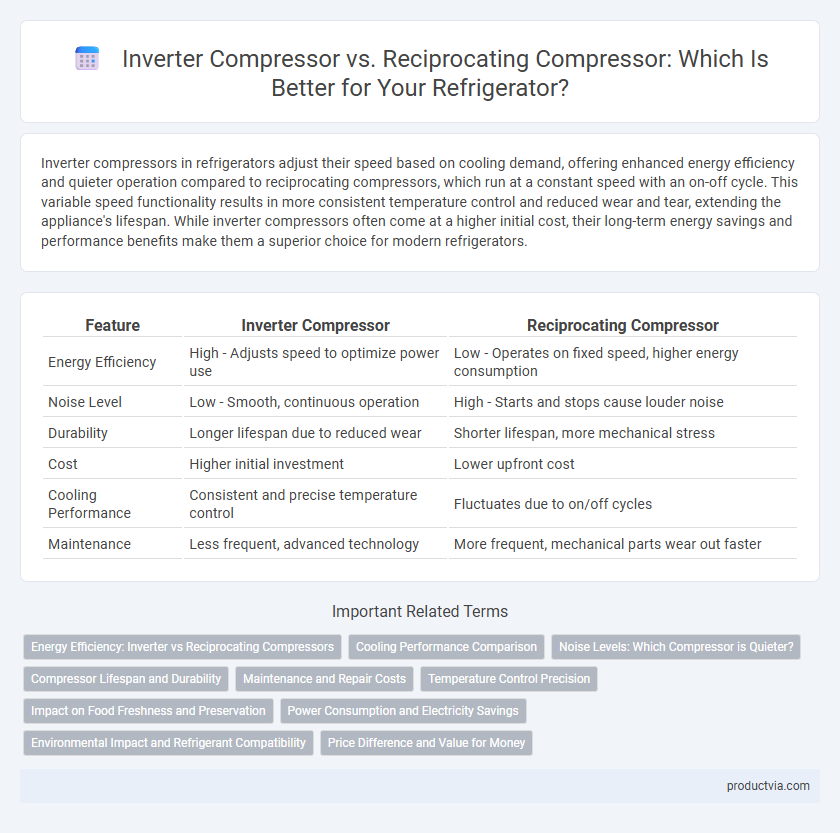Inverter compressors in refrigerators adjust their speed based on cooling demand, offering enhanced energy efficiency and quieter operation compared to reciprocating compressors, which run at a constant speed with an on-off cycle. This variable speed functionality results in more consistent temperature control and reduced wear and tear, extending the appliance's lifespan. While inverter compressors often come at a higher initial cost, their long-term energy savings and performance benefits make them a superior choice for modern refrigerators.
Table of Comparison
| Feature | Inverter Compressor | Reciprocating Compressor |
|---|---|---|
| Energy Efficiency | High - Adjusts speed to optimize power use | Low - Operates on fixed speed, higher energy consumption |
| Noise Level | Low - Smooth, continuous operation | High - Starts and stops cause louder noise |
| Durability | Longer lifespan due to reduced wear | Shorter lifespan, more mechanical stress |
| Cost | Higher initial investment | Lower upfront cost |
| Cooling Performance | Consistent and precise temperature control | Fluctuates due to on/off cycles |
| Maintenance | Less frequent, advanced technology | More frequent, mechanical parts wear out faster |
Energy Efficiency: Inverter vs Reciprocating Compressors
Inverter compressors in refrigerators adjust their speed based on cooling demand, leading to significant energy savings compared to reciprocating compressors that operate at a fixed speed and cycle on and off frequently. This variable speed functionality reduces power consumption by up to 30-50%, enhancing overall energy efficiency and lowering electricity bills. Reciprocating compressors tend to consume more energy due to frequent start-stop cycles, causing increased mechanical wear and reduced efficiency over time.
Cooling Performance Comparison
Inverter compressors provide precise speed control, leading to consistent cooling and energy efficiency in refrigerators, while reciprocating compressors operate at fixed speeds, causing temperature fluctuations. The continuous adjustment of inverter compressors results in faster cooling recovery and quieter operation compared to the start-stop cycling of reciprocating compressors. Performance tests show that refrigerators with inverter compressors maintain stable temperatures more effectively, enhancing food preservation and reducing power consumption.
Noise Levels: Which Compressor is Quieter?
Inverter compressors operate at variable speeds, producing significantly less noise compared to reciprocating compressors that run at a constant speed with frequent on-off cycles, generating more sound. The smooth and continuous operation of inverter compressors minimizes vibration and reduces noise levels to around 30-40 decibels, making them ideal for quiet environments. Reciprocating compressors typically produce louder noise, ranging between 45-55 decibels, due to their piston movements and sudden power surges.
Compressor Lifespan and Durability
Inverter compressors in refrigerators offer enhanced lifespan and durability due to their variable speed operation, reducing wear and tear compared to the constant start-stop cycles of reciprocating compressors. Reciprocating compressors, with their mechanical pistons, experience more friction and stress, often resulting in shorter operational life and higher maintenance needs. Advanced inverter technology ensures more consistent cooling performance and energy efficiency, extending the overall durability of the refrigerator's cooling system.
Maintenance and Repair Costs
Inverter compressors for refrigerators typically require less maintenance due to their advanced technology and fewer mechanical parts, resulting in lower repair costs over time. Reciprocating compressors, with more moving components, tend to experience higher wear and tear, increasing the frequency of repairs and associated expenses. Choosing an inverter compressor can lead to cost savings by minimizing maintenance interventions and extending the appliance's lifespan.
Temperature Control Precision
Inverter compressors offer superior temperature control precision compared to reciprocating compressors by continuously adjusting compressor speed to maintain consistent cooling levels. This variability allows inverter models to precisely regulate internal refrigerator temperatures, minimizing fluctuations and improving food preservation. Reciprocating compressors operate at fixed speeds, leading to more frequent on-off cycles that can cause temperature swings and less stable cooling performance.
Impact on Food Freshness and Preservation
Inverter compressors maintain consistent cooling temperatures with precise speed control, which helps preserve food freshness by reducing temperature fluctuations and preventing freezer burn. Reciprocating compressors operate cyclically, causing more frequent temperature swings that can accelerate food spoilage and moisture loss. Choosing an inverter compressor refrigerator enhances long-term food preservation and maintains optimal texture and flavor.
Power Consumption and Electricity Savings
Inverter compressors in refrigerators adjust their speed based on cooling demand, resulting in lower power consumption and significant electricity savings compared to reciprocating compressors, which operate at a fixed speed and frequently cycle on and off. Studies show inverter models reduce energy use by up to 30-50%, enhancing efficiency and lowering utility bills. The continuous operation of inverter compressors also minimizes wear and tear, extending appliance lifespan while maintaining optimal temperature control.
Environmental Impact and Refrigerant Compatibility
Inverter compressors in refrigerators provide superior energy efficiency and reduced greenhouse gas emissions by adjusting their speed to match cooling demands, leading to lower environmental impact compared to reciprocating compressors that operate at fixed speeds. They are compatible with advanced, eco-friendly refrigerants such as R600a and R134a, which have lower global warming potential (GWP), unlike many reciprocating compressors designed for older, less environmentally safe refrigerants like R22. The combination of inverter technology and sustainable refrigerants contributes significantly to minimizing the carbon footprint and improving the overall environmental compatibility of modern refrigeration systems.
Price Difference and Value for Money
Inverter compressors for refrigerators typically cost 20-30% more upfront than reciprocating compressors but offer significant energy savings, reducing electricity bills by up to 40%. The advanced technology in inverter compressors ensures quieter operation, longer lifespan, and better temperature control, translating to improved food preservation and lower maintenance expenses. Reciprocating compressors have a lower initial price but higher operational costs, making inverter models a more cost-effective investment over the refrigerator's lifetime.
Inverter Compressor vs Reciprocating Compressor for Refrigerators Infographic

 productvia.com
productvia.com